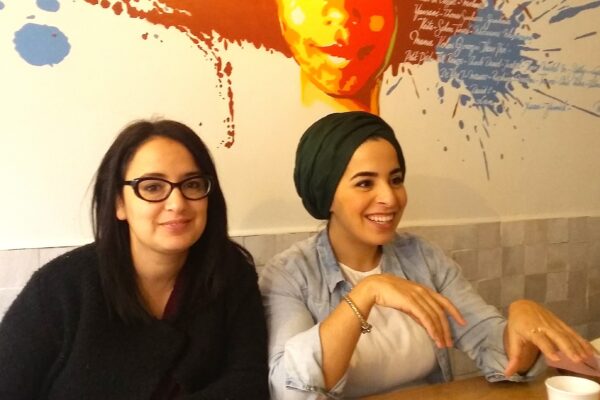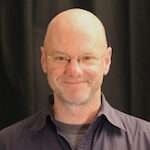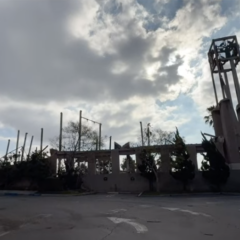This story was originally published by the Los Angeles Times as part of a reporting project supported by the Pulitzer Center for Crisis Reporting.
A light rain was falling as young men and women — some in hip European street clothes, others in hijabs or ankle-length robes — made their way under the high, saw-toothed roof of a former train depot for the annual Muslim Fair of Brussels. This year’s theme was “Islam and Reforms.”
“Where are the women?” asked Julie Pascoet as she took stock of the crowd in the fair’s VIP area. Pascoet, 32, her face and shining brown eyes framed in a light-colored hijab, is a policy analyst with a progressive anti-discrimination group that includes several prominent Muslim activists.
“I’m trying to promote the inclusion of Muslims in the majority society, but I have also been saying that it’s not acceptable, for example, to have so few Muslim women speaking in front of mixed Muslim crowds — both men and women,” Pascoet said.
Finding that delicate balance of interests — between a majority culture that has become increasingly secular and liberal, and members of a religious minority who fear being forced to abandon their beliefs — is the primary mission of a rising generation of Muslim activists in Europe.
Young and progressive-minded, they envision a future Europe in which they can feel fully at home. But as they seek the peaceful integration of Islam into European life, they face an array of forces aligned against them.
Pascoet encountered one of those forces when she looked at the clique of men in the VIP area at the Muslim fair. But the true depth of the problem became apparent a week later when Molenbeek, the heavily Muslim neighborhood that hosted the fair, became the scene of an international manhunt.
Police had quickly zeroed in on the district in their hunt for suspects in the attacks on Paris, in which extremists apparently guided by Islamic State had killed 130 people. It was another bitter setback for those who would champion tolerance and diversity.
Pascoet’s work with the European Network Against Racism, or ENAR, involves negotiating alliances with partners — gay and lesbian, feminist and Jewish activists, for example —who are sometimes suspicious of her motives. She must also convince conservative members of her own community that it’s in their interests to form alliances with progressive groups to oppose discrimination based on sexual orientation, for example, as well as religious identity.
“The dilemma is there’s no neat equation between any Islamic movement and secular, left-wing politics,” said Arun Kundnani, a scholar at New York University who writes on race, Islamophobia, political violence and surveillance.
In Europe, he said, some of the leading Muslim organizations trace their ideological origins to groups such as the Muslim Brotherhood, which was founded in Egypt, and Jamaat-e-Islami in South Asia. Kundnani said that in their countries of origin, these are conservative organizations with repressive approaches to gender roles, gay rights and the accommodation of religious minorities. But in Europe, where Muslims are in the minority and young people are looking for advocates who speak out against the racism and poverty that many of them experience, there are signs of change.
“The politics have become different because the context is different,” Kundnani said. “So the political parties many young Muslims in Europe want to ally themselves with are left-wing. Because of that dynamic, you see them taking much more liberal positions on women’s rights, gay rights and freedom of expression.”
So, for instance, ENAR, an organization with Muslims in prominent leadership positions, partnered with a lesbian, gay, bisexual and transgender group last year to produce an anti-discrimination video. ENAR, which is partly funded by the European Union, has also collaborated with Jewish advocacy groups to monitor online hate speech in the EU.
Some of the activists who are working on such projects are religiously observant Muslims like Pascoet and ENAR’s director, Michael Privot. Others identify themselves as “spiritual, but not religious” or simply nonbelieving.
What unites them — in addition to a dense web of social and organizational networks — is the idea that adapting Islam to the West is a two-way street. Muslims must be willing to oppose discrimination against other groups if they want to enlist non-Muslim allies in the fight against head-scarf bans and other constraints on religious expression. Non-Muslim majorities, for their part, must be willing to amplify and respect the voices of ordinary Muslims who are speaking out on issues that affect them.
The current tumult in Europe, however, threatens to undermine the efforts of Pascoet and her colleagues to integrate Muslim interests into left-wing political movements in Belgium and other parts of the European Union.
“It’s too early to see what the lasting impact will be,” said Privot. “But already we are looking at a different conversation in France and Belgium.” Muslim groups expected pushback from the far right, which has been galvanized by the Paris attacks, but they are also seeing less support from the left.
Rather than deepen his government’s commitment to integrating Muslims into Belgian society after Molenbeek became the scene of yet another terrorist manhunt, Charles Michel, Belgium’s center-left prime minister, has instead called for a “European CIA.”
In a report to Congress this spring, the Federation of American Scientists estimated that about 4,000 citizens from Western Europe have been recruited through Islamic State networks to join fighting in Syria, Iraq and other conflict zones.
Initiatives such as ENAR are intended as an antidote to such radicalization. But Privot said he worries that powerful interests could thwart efforts to integrate Muslim immigrants into secular societies.
“Conservative movements in the gulf region are able to devote millions of euros to training young people in Medina” — seat of Saudi Arabia’s ultra-orthodox Salafi movement — “and sending them back to Europe,” Privot said. “Salafism can be fertile ground for extremism.”
On the other hand, Privot and others complain that Western media depictions of Muslims focus relentlessly on extremism and violence — a trend documented by Britain’s News Tenor Institute, which has examined news articles in Western media since Sept. 11, 2001, and found that most depicted Islam as a source of violence.
“The news from the Middle East is mainly focused on religious fanaticism,” said Malikka Bouaissa, 34, founder of the online magazine al.arte. The magazine seeks to counter that impression with articles that spotlight artists, photojournalists and travel writers working primarily in the Middle East and North Africa, but also ranging as widely as Thailand, China and Turkmenistan.
Bouaissa was sitting in an Antwerp cafe tucked between an elegant museum housing the world’s oldest printing presses and a leafy park where two teenage boys were holding their own against a pair of larger young men in a pickup basketball game.
“Everything in the media is negative,” she said. “So youngsters here feel they have to protect their Muslim identity, always having to prove that they’re normal. All they hear growing up is that you’re useless.”
A few days after the Paris attacks, Pascoet — who was born in France — said she was still feeling shock and grief. She echoed Privot’s concerns about the possible loss of progressive allies and also worried that a deepening sense of isolation among Muslims would only make matters worse.
“There’s such an emotional and toxic debate right now,” she said. “France and Belgium want to tighten security measures, but if Muslim communities feel even more stigmatized, that’s counterproductive. The proper balance is going to be really difficult to find.”
Click here to read the full story from the LA Times.
Nick Street was a senior writer with the USC Center for Religion and Civic Culture.





